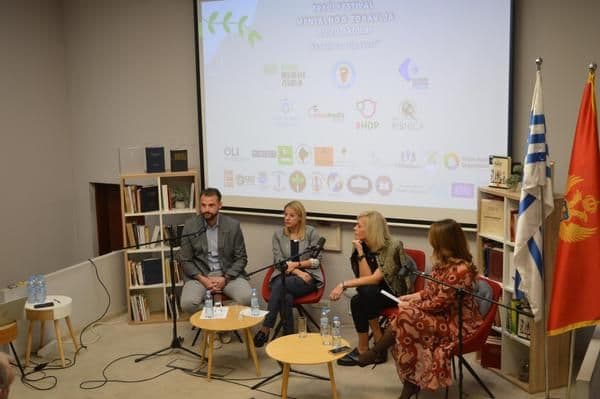Lifestyle
Trust and Responsibility: Key Themes at Mental Health Festival

A panel discussion launched the third edition of the Mental Health Festival in Montenegro, emphasizing the pressing need for trust and responsibility within society. As communities face increasing apathy and mental health crises, the event sought to address the urgent issues of trust in institutions and the stigma surrounding mental health care.
This year’s festival theme, “Do we live our values or only invoke them when needed?” challenged participants to reflect on the importance of trust and accountability in fostering healthy communities. The discussion highlighted that without a commitment to these values, mental health strategies are unlikely to be effective. Participants were urged to stop waiting for change and to start embodying the principles they advocate.
The conversation did not shy away from the harsh realities of a society grappling with rising anxiety levels, widespread distrust in institutions, and a deterioration of community bonds. Citizens expressed fatigue from ongoing injustices, while the importance of solidarity was noted as a source of strength rather than weakness.
Rather than offering quick fixes, the panel prompted deeper reflection on critical questions: “Does our society genuinely live by its values, or do we only reference them in times of crisis?” and “Have solidarity and empathy become luxuries reserved for difficult moments?” These questions were central in encouraging attendees to evaluate their individual and collective roles in nurturing a supportive environment.
This year, the festival focuses on three key values essential for personal and community well-being: **trust**, **social responsibility**, and **personal accountability**. Experts, including Dr. Tea Dakić, a psychiatrist and bioethics specialist, Mr. Mina Gazivoda, a psychologist, and Dr. Aleksandar Popović, psychiatrist and director of the Clinical Centre of Montenegro, shared their insights on these themes.
Dr. Dakić emphasized the critical need for citizens to trust their systems and institutions. She pointed to research showing a correlation between high levels of trust and lower suicide rates, noting that communities with strong solidarity are more proactive in seeking necessary interventions. “In societies characterized by distrust, isolation prevails, accompanied by a chronic sense of stress and an increased risk of suicide,” she remarked.
The discussion also touched on the perception of high corruption and selective justice prevalent in Montenegro. Dr. Dakić stated, “Surveys indicate that citizens lack trust in doctors, police, prosecutors, and the judiciary.” She highlighted a disconnect between mental health strategies and their implementation, particularly in light of Montenegro’s suicide rate, which is nearly double the European average.
Addressing the need for a culture of trust, Dr. Dakić questioned whether it is possible to create a circle of confidence in a society plagued by suspicion. She pointed out the biological implications of distrust, noting that if citizens do not believe in their institutions, they are less likely to seek help or report violence, perpetuating a cycle of despair.
Mr. Gazivoda added that social responsibility transcends professional titles and should reflect a commitment to community well-being. “The absence of responsibility from any individual member creates costs and harm that may not be immediately apparent but accumulate over time,” he explained. Research demonstrates that communities fostering trust and accountability are more resilient to crises.
Dr. Popović outlined the pillars of personal responsibility, which he believes are crucial for mental health. The first pillar is the responsibility individuals have towards themselves, which is often undermined by stigma. The second is the active pursuit of help, emphasizing that patients must engage in their recovery process. Finally, maintaining mental hygiene is presented as an ongoing commitment to well-being.
The festival was officially opened by Dr. Aleksandar Radović, director of the Clinical Centre of Montenegro, alongside Dr. Vilnerina Ramčilović, director of the Health Promotion Centre at the Institute of Public Health in Montenegro. The discussions were moderated by Dr. Tijana Brandmajer, a psychiatrist.
Running until **October 20, 2023**, the Mental Health Festival will feature events across six cities in Montenegro, with the majority taking place in the capital.
Mr. Gazivoda concluded by asserting that social responsibility ensures that freedom does not devolve into chaos, equality does not become a race to evade responsibility, and justice is actively pursued rather than creatively circumvented. “There can be no psychosocial well-being without a well-structured system, and we are all part of that system,” she said.
-

 Health3 months ago
Health3 months agoNeurologist Warns Excessive Use of Supplements Can Harm Brain
-

 Health3 months ago
Health3 months agoFiona Phillips’ Husband Shares Heartfelt Update on Her Alzheimer’s Journey
-

 Science2 months ago
Science2 months agoBrian Cox Addresses Claims of Alien Probe in 3I/ATLAS Discovery
-

 Science2 months ago
Science2 months agoNASA Investigates Unusual Comet 3I/ATLAS; New Findings Emerge
-

 Science1 month ago
Science1 month agoScientists Examine 3I/ATLAS: Alien Artifact or Cosmic Oddity?
-

 Entertainment5 months ago
Entertainment5 months agoKerry Katona Discusses Future Baby Plans and Brian McFadden’s Wedding
-

 Science1 month ago
Science1 month agoNASA Investigates Speedy Object 3I/ATLAS, Sparking Speculation
-

 Entertainment2 months ago
Entertainment2 months agoLewis Cope Addresses Accusations of Dance Training Advantage
-

 Entertainment4 months ago
Entertainment4 months agoEmmerdale Faces Tension as Dylan and April’s Lives Hang in the Balance
-

 World3 months ago
World3 months agoCole Palmer’s Cryptic Message to Kobbie Mainoo Following Loan Talks
-

 Science1 month ago
Science1 month agoNASA Scientists Explore Origins of 3I/ATLAS, a Fast-Moving Visitor
-

 Entertainment4 months ago
Entertainment4 months agoMajor Cast Changes at Coronation Street: Exits and Returns in 2025









